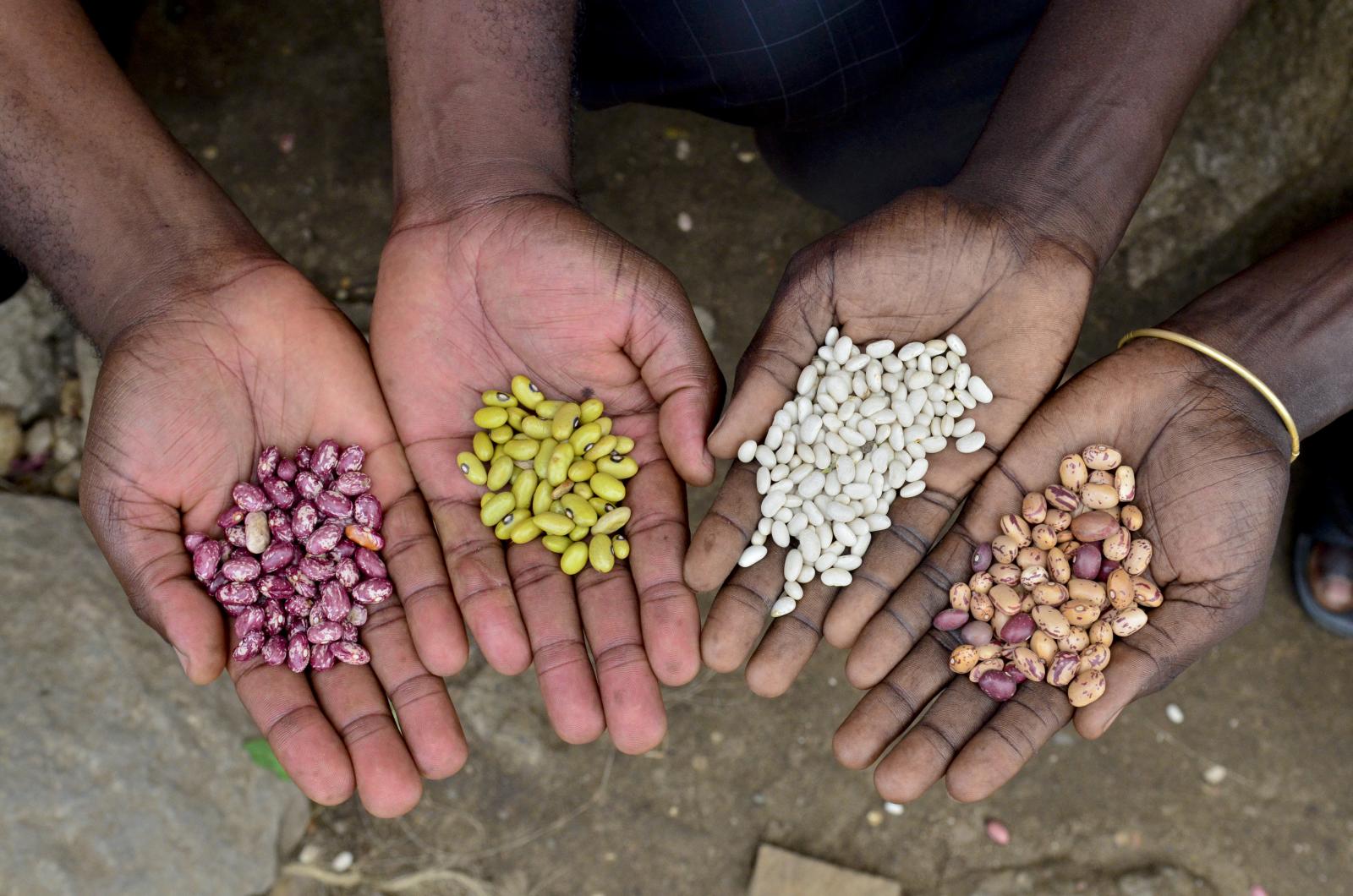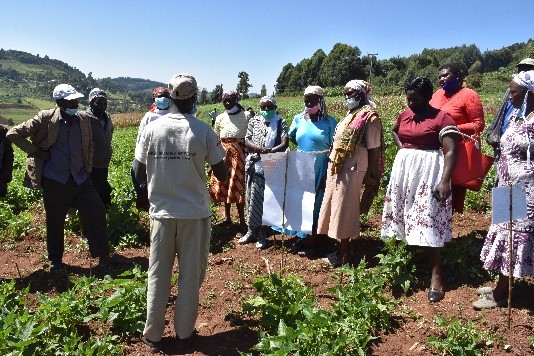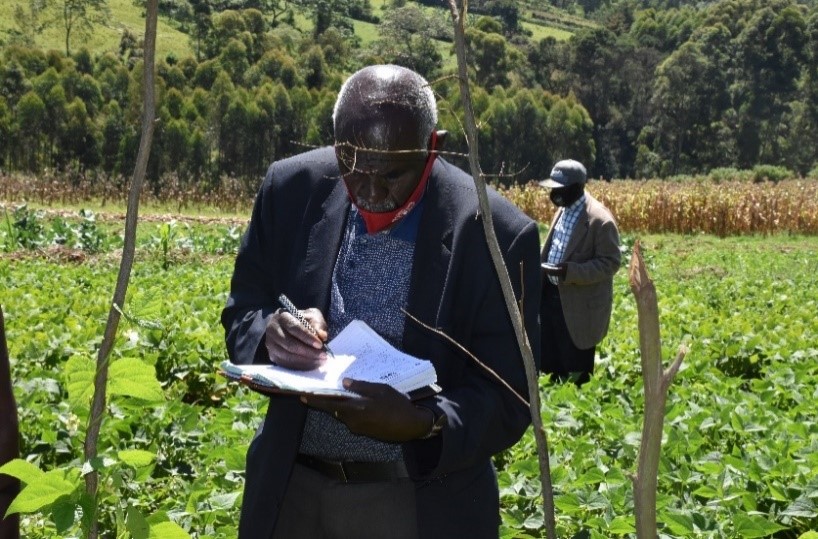
On the undulating landscape of Omobirona village, in Western Kenya, is a healthy bean crop planted to showcase the newly released high iron and zinc bean varieties; Angaza, Faida and Nyota.
Farmers with a thirst for knowledge are trickling in for a field day to learn about the nutritious beans, how best to grow them and available market opportunities.
Organised by the High Iron Beans Compact of Technologies for African Agricultural Transformation (TAAT) and Alliance of Bioversity International and CIAT through the Pan Africa Bean Research Alliance (PABRA), the field day attracted various stakeholders including AgroZ Kenya, Syngenta Kenya Ltd, Kenya Biologics Ltd, Greenlife Crop Protection Africa, Royal Seeds, Twiga Chemicals Ltd, SeedCo Kenya and Agrofoods Trading Ltd.
The field day equally enjoyed the partnership of the County Government of Nyamira, the Kenya Agricultural and Livestock Research Organization (KALRO), the Cereal Growers Association (CGA) and Yara International .
The favourable weather conditions in Nyamira makes it one of the counties with great potential to produce beans.
Most farmers have grown their traditional variety Onyoro that is low yielding and prone to disease attacks. The situation is changing as farmers start embracing new, high yielding and nutrient-dense bean varieties recently developed by KALRO through support of PABRA.
The varieties are promoted across Kenya through the TAAT High Iron Bean Compact (THC). Sponsored by the African Development Bank as part of its Feed Africa Initiative, TAAT’s main objective is to improve the business of agriculture across Africa by raising agricultural productivity, mitigating risks and promoting diversification and processing in 18 agricultural value chains within eight priority intervention areas.
The programme increases agricultural productivity through the deployment of proven and high-performance agricultural technologies at scale along selected nine commodity compacts which include High Iron Bean.
Led by Alliance of Bioversity International and CIAT, THC also addresses micronutrient deficiencies that are prevalent in Kenya especially among children (26% of children under five are stunted and 11% of them are underweight).
“Here in Nyamira County, we are encouraging the communities to embrace production and consumption of the micronutrient rich beans as

part of our nutrition-sensitive strategy to address anaemia and stunting and trigger economic empowerment,” Peris Mong’are, Nyamira County’s Executive Committee Member (Agriculture) remarked.
Iron is necessary for physical growth and cognitive and mental development for children and reduction of anaemia in women of reproductive ages, while zinc is useful in boosting immunity, especially against COVID-19.
The THC, County Government of Nyamira and other stakeholders have organized a series of on-farm demonstrations (demos) and field days to show the farmers the potential of the high iron and zinc beans.
“These demos are intended to show farmers that beans can, not only be produced for subsistence purposes but also for markets,” said Justin Mabeya, Alliance of Bioversity and CIAT.
Justin also emphasizes that having the right seed is the most critical starting point for bean production. The seed of these new varieties can be sourced from authorised seed producers such as KALRO Seed Unit, Agriscope, Bubayi, SeedCo and Dryland Seed.
Dr. Boaz Waswa a PABRA soil fertility specialist observes that one needs to practice good agricultural practices to achieve the full potential that is already in the seed.
Attention needs to be given to the health and fertility of the soil, timely weed management, pest and disease management and adopting climate smart technologies to overcome the adverse impacts of climate change.
Not only are the beans useful as food but also farmers can make money by selling the beans to local markets or to bean processors.
“We offer farmers competitive markets for beans. It is our hope that the market opportunity will serve as an incentive for farmers in Nyamira to produce large quantities of high quality beans to sell,” said Brighton Marieng’a of Agrofoods Trading Limited.
To take advantage of the market opportunities, farmers have organized themselves into a production cluster. “Our coming together as a group is to pull our efforts together to improve bean production. Being in a group, we will be able to plan together, aggregate our seed orders and input orders thus making it cheaper. It will also help us bulk the grain at harvest into tradeable volumes and negotiate better prices as a group,” said Yabesh Orina, a farmer and group leader Borabu Bean Farmers.
The biofortified varieties have shown great potential of production in Nyamira and surrounding counties and will go a long way in achieving Food and Nutrition Security Pillar of the Kenya Government as well as the SDG2 that assures Kenyans of the right to be free from hunger and to have adequate food of acceptable quality.
Josey Kamanda, the THC Leader avers that the above requires building a partnership/alliance along the bean value chain that will drive the shared agenda. “THC through its partnership with PABRA will continue to promote the technologies that boost productivity as well as nurture partnerships in the bean corridor for structured production linked to market demand” he added.


